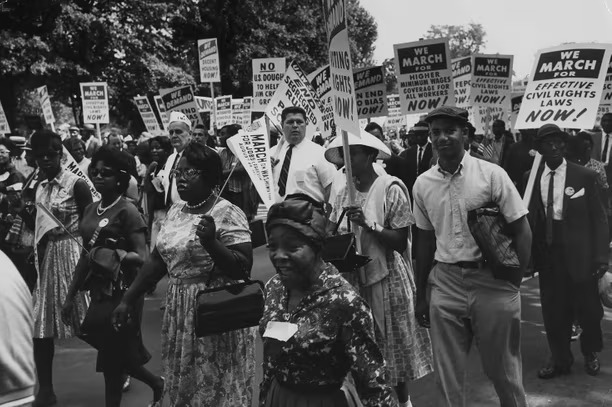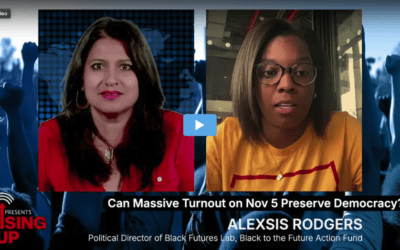Black Americans strongly support initiatives that would increase the minimum wage to $17, make affordable housing more accessible and create an equitable tax system, according to Black to the Future Action Fund, a political advocacy thinktank. On Thursday, the group released a 55-page economic agenda based on its 2023 survey of 211,219 Black people across all 50 states. The organization hopes that the report will serve as a roadmap for elected officials to address policy holes, and for advocates to generate campaigns that hold politicians accountable.
“We have to start imagining what it is that we want and not be so afraid to break out of what is,” said Alicia Garza, founder and former principal of Black to the Future Action Fund, at a Thursday symposium in Atlanta.
The agenda suggests a range of policy shifts around worker protections, housing, healthcare, childcare, higher education and taxes, along with examples of successful models already implemented by some state governments and municipalities. “Economic insecurity experienced by Black communities cannot be resolved solely by individual actions like working more hours, getting a college degree or saving money to buy a home,” the agenda’s authors wrote. “These issues are systemic, and government intervention is required to eliminate these inequities and improve outcomes for our people.”
Along with increasing the minimum wage to $17, the authors also recommended that elected officials pass labor protections for domestic workers, many of whom are Black women. The expansion of paid family and medical leave laws would help workers care for their household. And on the topic of affordable housing, the thinktank recommended laws that ensure rent payments are incorporated into credit scores so that renters have greater access to obtaining home mortgages.
Another suggestion for affordable housing included the development of shared equity programs, which use public or private investments to build or buy homes that are then sold at a reduced rate to low-to-moderate income homebuyers. There are currently 250,000 shared equity models mainly in New York City, according to the agenda. Christopher Towler, a political science associate professor at Sacramento State University and director of the Black Voter Project, called the programs “a really good model to try and get people into the housing market for there to be more first-time homebuyers”.
The origins of the US’s persistent racial wealth can be traced back to the transatlantic slave trade, when enslaved Black people were barred from accessing capital generated by their forced labor. During the Reconstruction period after the civil war, then president Andrew Johnson rescinded the 40 acres (16 hectares) of land promised to formerly enslaved Black people.
When Black communities did secure economic freedom, they were sometimes violently attacked by angry white mobs, including during the 1921 Tulsa race massacre, where an estimated 300 people were killed. Additionally, banks often denied home loans to Black Americans from the early 20th century until the passage of the 1964 Civil Rights Act that outlawed housing discrimination.

“The failures of Reconstruction have yet to be made up,” said Towler. “And a large part of that is the continued residential segregation and how Black Americans have been locked out, not only of the housing market, but of the resources, the wealth, the opportunity that comes along with where you live and your access to community.”
The legacy of systemic inequality has a continued impact on Black workers today, who earn less than US workers overall, according to 2022 Bureau of Labor Statistics data cited by Pew Research Center. The median weekly earnings of Black full-time wage and salary workers is $878, compared to $1,059 for all US workers, according to Pew.
During Thursday’s symposium, the actor and activist Kendrick Sampson, the singer and songwriter Trae Crockett, and the digital storyteller Conscious Lee spoke with Garza about the need for Black communities to brainstorm needed solutions and to band together to effect political change.
“When it comes to healthcare,” said Lee, “a lot of us … have internalized the Black inferiority when it comes to that industry. So for me, it’s really reimagining what it looks like for my grandma to get affordable insulin.”
Black census respondents listed a lack of affordable healthcare as their fourth most immediate economic concern. Expanding Medicaid to the 10 states that have not done so under the Affordable Care Act could help keep rural hospitals open. “The communities most affected when these rural hospitals close often have significant Black populations,” the report stated, “and closure means rural residents must drive 25 or more miles to access medical care.”
While Towler lauded the agenda as the first one he’s seen that addresses the concerns of Black communities nationwide, he believes that it will be a “tough sell” to mobilize Black voters. “Any sort of policy promises right now are going to be looked at with some hesitations, simply because the Biden administration’s policy agenda, although very numerous in its accomplishments, is still in some ways misunderstood,” said Towler. “There’s not a lot of knowledge with the common voter about how the policies that Biden passed have actually affected their individual lives.”
According to his research, Towler said that people are encouraged to be civically engaged when they’re taught how political institutions uphold the status quo to resist change: “If you even want there to be a possibility of reparations, we have to continue to vote, continue to be active and continue to put in place policy makers and legislators that are working towards that.”
At the end of the symposium, organizers asked participants to share the agenda with their network and elected officials. In the eyes of the Black to the Future Action Fund, the electorate is capable of shifting policy through mass mobilization.
“We are the power,” Sampson said toward the end of the symposium. “If we all are in alignment and we go in the same direction, now we are more powerful.”



